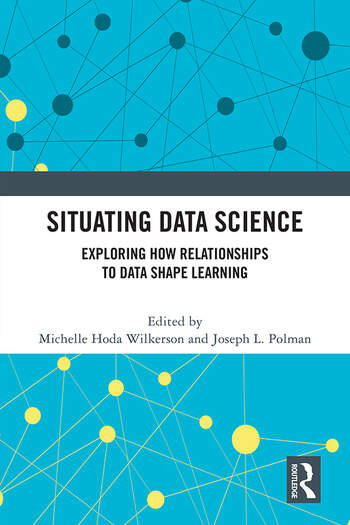 Situating Data Science: Exploring How Relationships to Data Shape Learning
Situating Data Science: Exploring How Relationships to Data Shape Learning
Edited by Michelle Hoda Wilkerson and Joseph L. Polman
To order contact:
Routledge (2022)
Lisa Hardy, Colin Dixon, and Sherry Hsi co-authored the chapter entitled “From Data Collectors to Data Producers: Shifting Students’ Relationship to Data.” This chapter contributes a theoretical framework informed by historical, philosophical, and ethnographic studies of science practice to argue that data should be considered to be actively produced, rather than passively collected. We further argue that traditional school science laboratory investigations misconstrue the nature of data and overly constrain student agency in their production. We use our “Data Production” framework to analyze activity of and interviews with high school students who created data using sensors and software in a ninth-grade integrated science class. To understand the opportunities for students to develop, act with, and perceive agency in data production, we analyze in detail the case of one student as she came to use unfamiliar technologies to produce data for her own personally relevant purposes. We find that her purposes for producing data emerged as she worked, and that resistances to her purposes were opportunities to act with and perceive her own agency, and to see data in new ways. We discuss implications for designing science learning experiences in which students act as agents in producing and using data.
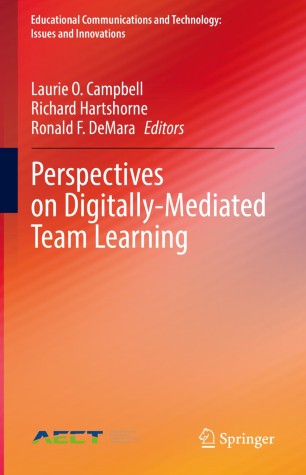 Perspectives on Digitally-Mediated Team Learning
Perspectives on Digitally-Mediated Team Learning
Edited by Laurie O. Campbell, Richard Hartshorne, and Ronald F. DeMara
To order contact:
Springer (2021)
Leslie Bondaryk and Chad Dorsey co-authored the chapter entitled “Aligning Teacher Facilitation Tools with Pedagogies in a Real-Time Environment for Mathematics Team Learning.” Digitally facilitated team-based classrooms require a rich set of tools to support teacher noticing and classroom orchestration. While only limited research has been done on effective tools for teachers, we have been able to construct a teacher dashboard along with feedback and content customization features that allow middle school mathematics teachers to effectively teach team-organized, digitally facilitated classes in an in-person, hybrid, or online classroom environment. Two key features of the digital environment include a dashboard allowing the instructor to monitor and inspect all student artifacts in real time and a workspace allowing teachers to generate and publish content of their own. We describe the functionality of the purpose-built STEM collaborative classroom system and the particular ways it facilitates effective classroom orchestration and noticing.
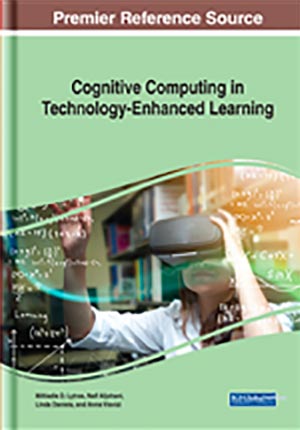 Cognitive Computing in Technology-Enhanced Learning
Cognitive Computing in Technology-Enhanced Learning
Edited by Miltiadis D. Lytras, Naif Aljohani, Linda Daniela, and Anna Visvizi
To order contact:
IGI Global (2019)
In the chapter “Exploration of Automated Image Processing Techniques in the Study of Scientific Argumentation,” Bo Pei, Henglv Zhao, Wanli Xing, and Hee-Sun Lee report on automated image processing we report on automated image processing used to quantify image features relevant to secondary students’ scientific arguments when they worked in an interactive model and made claims about whether rain water was trapped underground. Chi-square tests and independent samples t-tests were used to determine the relationships between the extracted features and the argumentation. The results revealed that the presence of a line on a student’s snapshot had a significant effect on that student’s claim and explanation scores, and the starting and endpoints of the students’ lines significantly influenced their explanation scores, but not their claim scores.
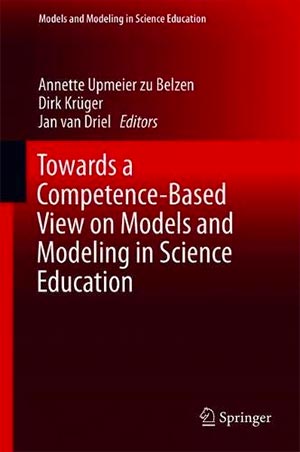 Towards a Competence-Based View on Models and Modeling in Science Education
Towards a Competence-Based View on Models and Modeling in Science Education
Edited by Annette Upmeier zu Belzen, Dirk Krüger, and Jan van Driel
To order contact:
Springer (2019)
Tom Bielik, Lynn Stephens, Dan Damelin, and Joseph Krajcik co-authored the chapter entitled “Designing Technology Environments to Support System Modeling Competence.” We focus on the development of students’ system modeling competence as they engaged in the modeling practice using an online modeling tool in a high school chemistry unit. We describe four aspects of system modeling competence: (1) defining the boundaries of the system by including components in the model that are relevant to the phenomena under investigation, (2) determining appropriate relationships between components in the model, (3) using evidence and reasoning to build, evaluate, and revise models, and (4) interpreting the behavior of a model to determine its usefulness in explaining and making predictions about phenomena.
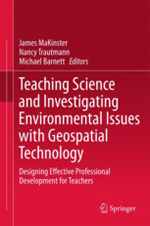 Teaching Science and Investigating Environmental Issues with Geospatial Technology
Teaching Science and Investigating Environmental Issues with Geospatial Technology
Edited by James MaKinster and Nancy Barnett
To order contact:
Springer (2014)
Daniel R. Zalles and Amy Pallant co-authored the chapter entitled “The Data Sets and Inquiry in Geoscience Education Project: A Model Curricula for Teacher Capacity Building in Scientific Inquiry Tasks with Geospatial Data.” The NSF-funded Data Sets and Inquiry in Geoscience Education project (DIGS) developed a set of curriculum modules comprising units and assessments in which students use real geospatial visualizations and data sets to conduct extended inquiry on plate tectonics and local climate change. As befits the differences in research on the two topics, the modules present data-centered inquiry tasks that vary in the amounts of structure inherent in the problems the students are asked to solve. Yet, both modules use presorted authentic data, lead students through scripted yet open-ended investigations, and provide implementation supports through scoring guides, teacher directions, and all-inclusive student and teacher Web access to the materials. This chapter describes how the modules have educative value for teachers by exemplifying contrasting curriculum models for data-based inquiry, by showing how driving purposes that stimulate student thinking and expression can be articulated, and by showing how scaffolding can be strategically employed to enable successful student inquiry.
 Multiple Representations in Biological Education
Multiple Representations in Biological Education
Edited by David F. Treagust and Chi-Yan Tsui
To order contact:
Springer (2013)
Paul Horwitz’s chapter entitled “Evolution is a model, why not teach it that way?,” describes our Evolution Readiness learning activities and research about their use with fourth grade students.
An important goal of the Evolution Readiness project was to create technology that would support an approach to biology education based on evolution through natural selection. The teleological aspect of biology—the fact that organisms appear at first glance to be designed for particular purposes—is not treated very well in the traditional K-12 curriculum, which mostly deals with data (what do we see when we observe the living world?) rather than process (how did it get that way?). This is hardly surprising, given that the processes responsible for evolution are slow-acting, indirect and difficult to observe. Evolution Readiness created a sequence of interactive learning activities that overcame these difficulties by enabling children as young as ten years old to experiment with virtual plants and animals and observe processes that would normally be inaccessible to them.
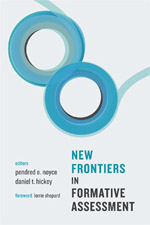 New Frontiers in Formative Assessment
New Frontiers in Formative Assessment
Edited by Pendred Noyce and Daniel Hickey
To order contact:
Harvard Education Press (2011)
1-888-437-1437
From the publisher: New Frontiers in Formative Assessment is for educators who want to tap into the power of formative assessment. It showcases ongoing work that pushes the field of formative assessment forward in key ways. Drawn from a variety of classrooms in terms of age level, subject area, and use of technology, the chapters in this book highlight the importance of context in developing effective formative assessment practices. At the same time, the volume addresses the common elements of a successful formative assessment project—notably, high interest, manageability, impact, and validity—as well as some common barriers to implementation. Taken together, these projects illustrate the journey from assessment of learning to assessment for learning—and ultimately toward assessment as learning.
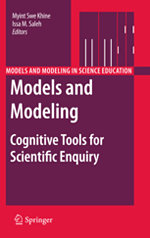 Models and Modeling: Cognitive Tools for Scientific Enquiry
Models and Modeling: Cognitive Tools for Scientific Enquiry
Edited by Myint Swe Khine and Issa M. Saleh
To order contact:
Springer (2011)
Springer’s book Models and Modeling: Cognitive Tools for Scientific Enquiry includes a chapter by Charles Xie and Amy Pallant. “The Molecular Workbench Software: An Innovative Dynamic Modeling Tool for Nanonscience Education” demonstrates how dynamic modeling of nanoscale phenomena based on first principles provides a direct approach to making nanoscience more accessible and teachable in the classroom.
Nanoscience and nanotechnology are critically important fields in the 21st century and as such are requiring changes in secondary science education. Nanoscience education aims at cultivating students’ ability to reason about complex phenomena based on first principles governing the structures, interactions, and dynamics of electrons, atoms, and molecules. But teaching nanoscience and nanotechnology be quite challenging. This chapter presents lessons learned through the research, development, and classroom implementation of educational nanoscience simulations using the Molecular Workbench (MW) modeling software.
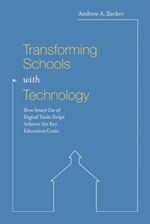 Transforming Schools with Technology: How Smart Use of Digital Tools Helps Achieve Six Key Education Goals
Transforming Schools with Technology: How Smart Use of Digital Tools Helps Achieve Six Key Education Goals
Andrew A. Zucker
To order contact:
Harvard Education Press (2008)
1-888-437-1437
“This timely and thoughtful book argues that technology can and will play a central role in efforts to achieve crucial education goals, and that it will be an essential component of the further improvement and transformation of schools. Author Andrew A. Zucker develops his arguments by drawing on the most up-to-the-minute information about digital technologies and what we know about how they affect teaching and learning in real schools.
The book is marked not only by Zucker’s sophistication about digital technologies, but also by his longstanding engagement with and commitment to K-12 education. It is destined to be recognized as the crucial volume on digital technology and education, and it will be essential reading for school leaders and teachers, policymakers, and those members of the general public—among them parents and engaged citizens—for whom the fate of education is a vital concern.”
—Harvard Education Press
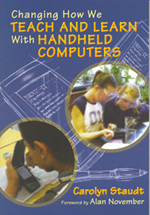 Changing How We Teach and Learn With Handheld Computers
Changing How We Teach and Learn With Handheld Computers
Carolyn Staudt
To order contact:
Corwin Press (2004)
1-800-818-7243
Create a dynamic, interactive environment that extends beyond the classroom!In this digital era, how can educators seamlessly incorporate technology into everyday classroom use? The economical, portable solution is handheld and other portable technologies. Handheld devices are already a part of the student’s world. Now educators can embrace this technology and create a powerful learning environment. This book discusses the rationale for handhelds in today’s learning environments and gives educators practical applications employing this technology through:
- Surefire learning activities in all content areas
- Resources for downloading student friendly software
- Beaming and data sharing tips
- Step-by-step processes for manipulating and displaying data
- Field knowledge from classrooms already employing handhelds
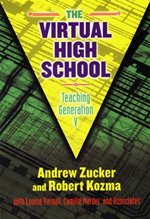 The Virtual High School: Teaching Generation V
The Virtual High School: Teaching Generation V
Andrew Zucker and Robert Kozma, with Louise Yarnall, Camille Marder, and Associates
To order contact:
Teachers College Press (2003)
P.O. Box 20
Williston, VT 05495-0020
Phone: 1-800-575-6566
“This study provides a balanced perspective on the evolution of virtual high school courses and programs . . . invaluable for anyone seeking to develop virtual learning experiences at any developmental level, in any context.”
—From the Foreword by Chris Dede
“Zucker and Kozma’s balanced perspective on the Virtual High School experience is perfect for policymakers. They identify what’s needed for good teaching and successful learning and cogently point out barriers that must be overcome if online learning is to become a viable option in American public education.”
—Mary Hynes, Arlington School Board, Arlington, Virginia
Just a decade ago, the notion of attending high school on the Internet seemed futuristic. Yet, today, thousands of students are doing just that. This authoritative volume is the first to provide a thorough, detailed account of the virtual high school. Based on a five-year study conducted by experienced researchers at SRI International, this book answers such questions as: What is the difference between an online and a face-to-face classroom? What is it like to take, or to teach, an online course? Are online courses effective? What are the problems with virtual schooling? Will this new technology change the way teaching and learning is done? Providing invaluable insight into an increasingly popular educational technology, this book:
- Examines the phenomenal growth of virtual high schooling, especially through the lens of one of the pioneering efforts—the Hudson Public Schools–Concord Consortium Virtual High School (VHS).
- Draws on a massive research study that includes surveys, focus groups, classroom observations, and interviews with superintendents, principals, teachers, students, and leaders of many virtual high schools.
- Provides a balanced perspective that addresses both the strengths and weaknesses of online learning, including lessons learned.
- Provides crucial information to assist educators and policymakers in creating, adapting, and learning how to effectively use these new online schools.
- Examines the implications that online schooling has for the future of education.
 Essential Elements: Prepare, Design, and Teach Your Online Course
Essential Elements: Prepare, Design, and Teach Your Online Course
Bonnie Elbaum, Cynthia McIntyre, and Alese Smith
To order contact:
Atwood Publishing (2002)
P.O. Box 3185
Madison, WI 53704-0185
Phone: (888) 242-7101 Fax: (608) 242-7102
“This book describes a process for designing online courses based on sophisticated learning experiences: guided inquiry, collaboration, community, and formative assessment. Its model will aid instructors in reconceptualizing their teaching to take full advantage of new interactive media.”
—Chris Dede, Timothy E. Wirth Professor of Learning Technologies, Harvard Graduate School of Education
University professors, secondary teachers, and corporate trainers are putting their courses online, or are getting ready to. Where do they start, you wonder. Where do you start, if you’re in similar position? Based on the authors’ experience helping to develop hundreds of online courses, Essential Elements: Prepare, Design, and Teach Your Online Course describes the process of putting your course online. With seventeen Essential Elements and countless tips to implement those elements, we show you how to create a high-quality learning environment for your students.
We present the Essential Elements in three sections — prepare, design, and teach — to help you get your course online in step-by-step format. First, we cover the necessary preparatory steps, from getting yourself ready to getting your course ready. You’ll create a course outline and consider issues around technology support and quality assurance. Next, we move to course creation and show you how to design collaborative online activities, plus how to locate appropriate course materials. Finally, we reveal online teaching strategies to engage participants, moderate online discussions, and assess participant work.
 Portable Technologies: Science Learning in Context
Portable Technologies: Science Learning in Context
Edited by Robert Tinker and Joseph Krajcik
To order contact:
Kluwer Academic/Plenum Publishers (2001)
233 Spring Street
New York, New York 10013-1578
Phone: (212) 620-8000 Fax: (212) 463-0742
E-mail: info@plenum.com
Education has traditionally studied the world by bringing it into the classroom. This can result in situated learning that appears to students to have no relevance outside the classroom. Students acquire inert, decontextualized knowledge that they cannot apply to real problems. The obvious solution to this shortcoming is to reverse the situation and bring the classroom to the phenomena: to learn in a rich, real-world context. The problem with the real world is that it is complex and filled with interactions that are hard to sort out. The editors and authors believe that the right tools might help students with this sorting process and result in learning in rich contexts. This book is an account of a series of experiments designed to explore the validity of this insight.
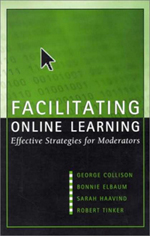 Facilitating Online Learning: Effective Strategies for Moderators
Facilitating Online Learning: Effective Strategies for Moderators
George Collison, Bonnie Elbaum, Sarah Haavind, and Robert Tinker
To order contact:
Atwood Publishing (2000)
P.O. Box 3185
Madison, WI 53704-0185
Phone:(888) 242-7101 Fax:(608) 242-7102
Online courses are now integral learning mediums in traditional education settings, business, and the new distance campuses. Educators often find that they need a new repertoire of skills or a new way of using old skills to be successful in the new medium.
Facilitating Online Learning is a groundbreaking handbook that lays out a systematic approach for creating a learning community in which the instructor moves away from center stage and from which a more collaborative learning environment is effectively fostered.
The goals of Facilitating Online Learning are to develop these skills:
- Increased capacity to build effective online learning communities
- Wider repertoire of strategies for sharpening the discussions related to course content
- New strategies for deepening online dialogue in order to enrich learning opportunities
Online learning has sparked a resurgence of interest in teaching technique and strategies and in the hows and whys of learning. Facilitating Online Learning offers the novice and the seasoned educator the opportunity to grow with this exciting new medium.
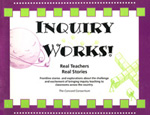 InquiryWorks! Real Teachers, Real Stories
InquiryWorks! Real Teachers, Real Stories
To order contact:
The Concord Consortium (2000)
25 Love Lane, Concord, MA 01742
Phone: (978) 405-3200 Fax: (978) 405-2076
E-mail: info@concord.org
“Inquiry is a multifaceted activity that involves making observations; posing questions; examining books and other sources of information to see what is already known; planning investigations; reviewing what is already known in light of experimental evidence; using tools to gather, analyze, and interpret data; proposing answers, explanations, and predictions; and communicating the results. Inquiry requires identification of assumptions, use of critical and logical thinking, and consideration of alternative explanations.”
—National Science Education Standards, National Research Council, 1996
In the current reform movement, inquiry sits front and center in the vision of practice. But inquiry in the classroom and the student-centered, open questioning environment it entails can prove challenging for teachers. To teach using inquiry, teachers need first to experience for themselves what inquiry actually means and then carefully build their capacity to teach with inquiry-based curricula.
InquiryWorks! Real Teachers, Real Stories details the stories of eight participants in a unique online and hands-on workshop on inquiry. Their stories are not highly polished case studies recounted by experienced researchers. Nor are they inspirational self-portraits written by recognized master teachers on the cutting edge of educational reform. These frontline stories evolved out of each teacher’s final reflections on their experience and from honest contributions to online discussions and heartfelt entries in journals.
Learn how inquiry can challenge and inspire.
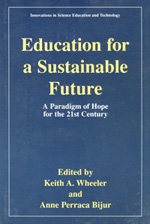 Education for a Sustainable Future: A Paradigm of Hope for the 21st Century
Education for a Sustainable Future: A Paradigm of Hope for the 21st Century
Edited by Keith A. Wheeler and Anne Perraca Bijur
To order contact:
Springer Online (2000)
This book illustrates how sustainability, information technologies, and envisioning the future can be effectively woven into an integrated educational experience. By understanding what it takes to build a sustainable community, students develop the skills needed to engage successfully in a sustainable society. They explore their own values, the values of the community and the values of society at large. Students build awareness of the choices they make and determine whether or not these choices support their future. Using the real world as their classroom, students participate in gathering and analyzing data, clarifying values, listening, speaking, creatively thinking, and making decisions about their community.